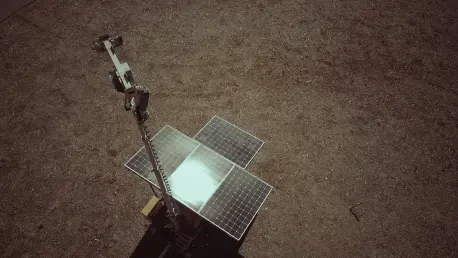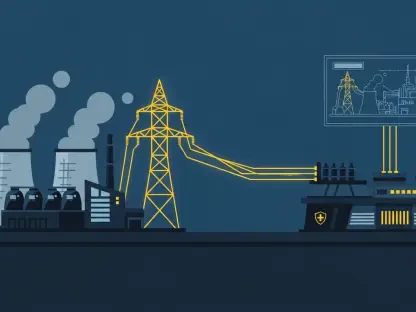In an era where the urgency of combating climate change has never been more pronounced, JA Solar emerges as a beacon of hope and innovation within the photovoltaic (PV) industry, demonstrating that sustainable energy solutions can drive both environmental and commercial success. As a global leader in solar energy, this company has spent nearly two decades refining its approach to clean power, embedding environmental, social, and governance (ESG) principles into every facet of its operations. With a mission to advance solar technology for the benefit of the planet, JA Solar stands out by balancing cutting-edge advancements with a steadfast commitment to sustainability. From pioneering low-carbon products to transforming iconic spaces with renewable energy, the company’s efforts are reshaping the landscape of green technology. This article delves into the multifaceted strategies that position JA Solar as a trailblazer, exploring its technological breakthroughs, operational excellence, and impactful collaborations that inspire a cleaner future.
Pioneering Low-Carbon Technology
JA Solar’s dedication to sustainability shines brightest through its innovative Low Carbon Module series, a game-changer designed to reduce embedded carbon by up to 40% compared to conventional solar modules. By integrating as much as 50% recycled materials alongside sustainably sourced polysilicon, these modules not only enhance efficiency but also minimize environmental harm. Full traceability is achieved through unique identification codes and adherence to rigorous standards like ISO 14067 for lifecycle assessments. Independent validations further confirm that harmful substances are absent, ensuring the modules meet the highest safety and eco-friendly criteria. This technological leap underscores a broader vision where solar solutions must prioritize planetary health without compromising performance, setting a benchmark for others in the industry to follow and proving that innovation can align seamlessly with ecological responsibility.
The impact of JA Solar’s low-carbon advancements extends beyond mere product design, reflecting a deep-rooted commitment to redefining industry norms. The meticulous process of verifying materials and ensuring transparency through third-party certifications highlights a proactive stance on environmental accountability. This approach not only addresses the immediate need for cleaner energy alternatives but also tackles long-term challenges like resource scarcity by promoting the use of recycled components. Such efforts resonate with global demands for sustainable practices, positioning the company as a leader in crafting solar technologies that are both forward-thinking and grounded in real-world impact. By focusing on reducing carbon footprints at the product level, JA Solar paves the way for broader adoption of green energy solutions, encouraging a shift toward more responsible consumption and production patterns across the sector.
Sustainable Operations and Circular Practices
Sustainability at JA Solar permeates every level of its manufacturing processes, where stringent measures for emission control, water conservation, and waste management are not just met but exceeded. Factories are designed to surpass regulatory requirements, implementing systems that actively protect biodiversity and reduce environmental impact. This operational excellence showcases a model where industrial activity and ecological stewardship coexist harmoniously. By prioritizing resource efficiency, the company minimizes its footprint while maintaining high production standards, proving that large-scale manufacturing can align with green principles. Such practices set a precedent for how solar energy companies can contribute to global sustainability goals through responsible operations.
A key pillar of JA Solar’s operational strategy is its embrace of circular economy principles, ensuring that materials are not discarded but reused within the supply chain. Through strategic collaborations with recycling partners, end-of-life modules are repurposed, reducing waste and dependency on virgin resources. This forward-thinking approach addresses the critical issue of resource depletion, a growing concern in the renewable energy sector. By embedding these practices into its core operations, the company not only mitigates environmental harm but also fosters a culture of sustainability that influences suppliers and partners alike. This holistic integration of green practices across production stages illustrates a commitment to long-term planetary health, reinforcing JA Solar’s role as an industry innovator dedicated to sustainable growth.
Commitment to Transparency and Ethical Governance
Transparency stands as a fundamental value for JA Solar, evident in its rigorous supplier audits and continuous monitoring of upstream risks to uphold labor and environmental standards. Cross-departmental oversight of ESG initiatives ensures that sustainability is woven into the fabric of decision-making processes. This dedication to accountability has garnered notable recognition, such as the Solar Stewardship Initiative (SSI) Silver Medal for its facilities in Shanghai Fengxian and Yangzhou, alongside the EcoVadis Silver Medal for ethical procurement practices. These accolades reflect a broader mission to build trust with stakeholders through consistent and verifiable actions, demonstrating that governance is as critical as innovation in driving sustainable progress within the solar industry.
Beyond internal policies, JA Solar actively contributes to shaping global sustainability standards as a key member of the SSI, influencing protocols that elevate industry-wide practices. This role highlights a commitment to not only meet but also redefine expectations for ethical conduct and environmental responsibility. By fostering a culture of openness through structured reporting and third-party validations, the company ensures that every step of its supply chain aligns with stringent criteria. Such efforts resonate with the growing demand for corporate responsibility, positioning JA Solar as a trusted partner in the clean energy transition. This focus on governance serves as a reminder that true leadership in sustainability requires a foundation of integrity and transparency to inspire confidence and drive meaningful change.
Innovation and Global Impact Through Partnerships
At the heart of JA Solar’s mission lies a relentless drive for innovation, evidenced by substantial investments in research and development, with over €500 million allocated in 2024 to advance technologies like TOPCon and introduce the DeepBlue 5.0 series. These efforts have translated into shipping more than 80 GW of PV modules in the same year, significantly curbing over 50 million tons of CO2 emissions worldwide. This scale of impact underscores the company’s pivotal role in accelerating the global shift toward renewable energy. By pushing the boundaries of solar technology, JA Solar not only enhances energy efficiency but also makes clean power more accessible, contributing to broader environmental goals and reinforcing its position as a frontrunner in the industry.
Collaboration amplifies JA Solar’s influence, as strategic partnerships across sectors enable the integration of solar solutions into diverse applications. These alliances showcase the versatility of renewable energy in addressing varied challenges, from urban infrastructure to industrial needs. By working with global entities, the company extends the reach of its sustainable technologies, fostering collective action to combat climate change. Each partnership reflects a shared vision of leveraging clean energy for societal benefit, highlighting how interconnected efforts can yield greater environmental outcomes. This collaborative spirit ensures that JA Solar’s innovations resonate on a global scale, inspiring other industries to adopt similar models of cooperation and sustainability in their operations.
Transforming Iconic Spaces with Clean Energy
One of JA Solar’s most compelling demonstrations of impact is its involvement in the Signal Iduna Park project at Borussia Dortmund, poised to be the largest stadium roof PV installation globally. Featuring over 11,000 modules, this initiative generates 4 GWh of clean electricity each year, slashing 1,800 tons of CO2 emissions annually. This remarkable feat merges the worlds of sports and sustainability, captivating millions of fans and showcasing the potential of renewable energy in high-profile settings. Selected for its reliable, high-quality modules and unwavering environmental ethos, JA Solar proves that clean energy can redefine iconic spaces, turning them into symbols of a greener future while delivering measurable ecological benefits.
The significance of this project extends beyond numbers, serving as a powerful testament to how solar technology can inspire widespread change through visible, impactful applications. By transforming a renowned venue into a hub of renewable energy, JA Solar bridges cultural and environmental narratives, encouraging public awareness and support for sustainable initiatives. This endeavor highlights the tangible results of integrating advanced solar solutions into everyday life, offering a blueprint for other sectors to follow. The intersection of innovation and inspiration in such projects underscores the company’s vision that renewable energy must be both practical and aspirational, driving progress while capturing the imagination of diverse audiences around the globe.
Reflecting on Milestones and Future Horizons
Looking back, JA Solar’s journey reveals a steadfast dedication to sustainable solar energy, marked by pioneering low-carbon technologies, ethical governance, and transformative projects that redefine industry standards. The integration of circular practices in operations and substantial contributions to global CO2 reductions stand as testaments to the company’s impact over nearly two decades. High-profile initiatives like the Borussia Dortmund installation exemplify how clean energy can intersect with cultural landmarks, inspiring broader adoption. Moving forward, the focus should shift to scaling these innovations through enhanced R&D investments and deeper international collaborations. Exploring new applications for solar technology in underserved regions could further amplify environmental benefits, while continued advocacy for stringent sustainability standards might push the sector toward even greater accountability. These steps promise to build on past achievements, ensuring that the legacy of responsible energy solutions endures for generations.









